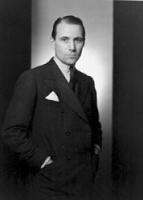
Year Born: 1904
Year Died: 1941
Pioneer
Plaunt, Alan (1904-1941)
Alan Butterworth Plaunt was not a broadcaster, but his lobbying campaign that largely contributed to the adoption of public broadcasting in Canada occupies a vital place in the annals of Canadian broadcast history.
Plaunt was born in Ottawa on March 25th 1904, in the era in which Reginald Fessenden invented radio broadcasting. He was educated at University College, University of Toronto, where he obtained a B.A. in 1927, and at Christ Church, Oxford, where he achieved an Honours B.A. in History in 1929. It was at Oxford that he met Graham Spry, and together they would have a significant impact on the future of broadcasting in Canada.
In 1927, Spry had suggested to the Canadian government that to celebrate the 60th anniversary of the founding of Confederation, a coast-to-coast network connecting all existing radio stations should be contrived to broadcast the official ceremony taking place on Parliament Hill on July 1st.
The technical facilities to set-up a network did not readily exist, but a patchwork linking of Canadian and American telephone and telegraph lines for the first time enabled the Prime Minister, W.L. Mackenzie King, to address Canadians within earshot of a radio receiver.
About the same time, a murmur of discontent over the domination of the unregulated radio dial by nearby and powerful distant American radio stations was being heard in Ottawa.
In December 1928, the Canadian Governor in Council appointed a Royal Commission on Broadcasting – later to become known as “The Aird Commission” -to inquire into the radio broadcasting situation throughout Canada, and to advise as to its future administration, management, control and finance.
Plaunt and Spry responded with their plan for Canadian radio — Public Broadcasting – the central concept of which was a coast-to-coast network of high-powered stations, built and programmed with funds derived from the licensing of radio receivers. They stopped short of suggesting the nationalization of all broadcasting and recommended the continuance of private local stations that could carry the public network’s programming as well as produce local programs. To sell their idea, and to stir national interest in the Aird Commission’s function, the two men created The Canadian Radio League in 1930 as a lobby group.
The efforts of the League were impressive. After receiving and debating the Aird Commission’s Report, the Government went on to enact the legislation that created the Canadian Radio Broadcasting Commission in 1932 and the Canadian Broadcasting Corporation in 1936. The League was disappointed at not achieving everything it had proposed and continued to be active in its lobbying role.
In 1936, when the CBC succeeded the CRBC, Alan Plaunt was appointed a member of the Board of Governors of the CBC and was thus in a position to influence the drafting of its regulations that governed all broadcasting – public and private. In 1941, he resigned from the Board because, according to one report, he could not accept responsibility for the conditions of organization and management of the CBC
Alan Butterworth Plaunt died of cancer on September 12, 1941, but his legacy remains. In 1958, Carleton University in Ottawa established the Alan B. Plaunt Memorial Lectures, which ran annually until 1982. In 1986, marking the 50th anniversary of the CBC, author Michael Nolan published a tribute to Alan Plaunt and the many who supported him, titled “Foundations: Alan Plaunt and the Early Days of CBC Radio”.
Written by J. Lyman Potts, February 2008
